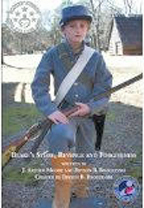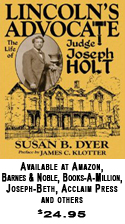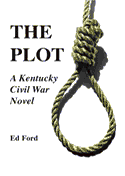|
Bugle book review…
‘Blake’s Story’ provides deeper look
on perspectives of Civil War emotions
“Blake’s Story, Revenge and Forgiveness,” by J. Arthur Moore and Bryson B. Brodzinski, Xlibris 2014, 160 pages, softcover, $15.50
Reviewed by
ED FORD
Editor/Publisher
The Kentucky Civil War Bugle
War often is viewed by the inexperienced as noble, exciting and heroic. But the perspective changes when you see it first hand. That’s the way it happened for 10-year-old Blake Bradford.
 Blake, the central character of this story, lives with his parents on a plantation in Shelby, N.C. The youngster idolizes his father, Micah. When Micah Bradford joins the Civil War in 1861 with other North Carolina patriots, Blake remains close to his father as the men drill, plan and eventually move out to join the Civil War in Tennessee. Blake, the central character of this story, lives with his parents on a plantation in Shelby, N.C. The youngster idolizes his father, Micah. When Micah Bradford joins the Civil War in 1861 with other North Carolina patriots, Blake remains close to his father as the men drill, plan and eventually move out to join the Civil War in Tennessee.
The youngster is proud of his father who is named a captain and leads the troops into battle against the Yankees in Kentucky and Tennessee. But everything changes when Capt. Micah is killed at the bloody battle of Shiloh.
Blake’s pride turns to bitterness as he experiences the death of his father. That bitterness drives him to revenge. He pledges to go to war himself, find the one who killed his father and avenge his death.
Ironically, Blake experiences the war from both sides. He enters the conflict during the Confederate campaign into Kentucky in 1862 with the 2nd Tennessee Infantry. But, during the Battle of Perryville, he’s wounded, but saved by young Union soldiers. He become friends with them and joins the 31st Indiana. Now, he’s experiencing the war from both sides and, surprisingly, discovers that one of his new friends could be the one who killed his father.
The most striking aspect of “Blake’s Story,” is the way in which war changes the perspective of its young protagonist. The author skillfully shows how Blake achieves a remarkable maturity from his experience of life and death in just a few short months. Blake finds a lot of gray matter within the scope of what he initially perceives as strictly black and white.
As Alexander Pope once wrote, “to err is human, to forgive is divine.” Author Arthur Moore shows how even a youngster can discover the value of such a philosophy.
Read this book. It’s a different perspective on something of value.
|














 Blake, the central character of this story, lives with his parents on a plantation in Shelby, N.C. The youngster idolizes his father, Micah. When Micah Bradford joins the Civil War in 1861 with other North Carolina patriots, Blake remains close to his father as the men drill, plan and eventually move out to join the Civil War in Tennessee.
Blake, the central character of this story, lives with his parents on a plantation in Shelby, N.C. The youngster idolizes his father, Micah. When Micah Bradford joins the Civil War in 1861 with other North Carolina patriots, Blake remains close to his father as the men drill, plan and eventually move out to join the Civil War in Tennessee.